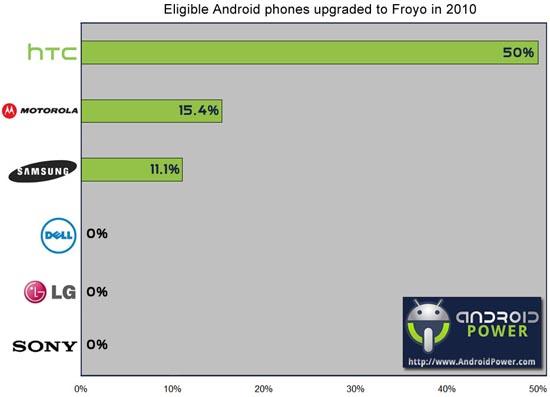
Earlier today we told you about a study that found that Verizon not only updated more of their Android phones to Froyo than any other carrier between June and December 2010, but they were also the fastest at updating too. On the other end of the spectrum, we have AT&T, who couldn't manage to update a single Android phone in their rather small lineup in 2010. Likewise, neither Dell, LG, nor Sony Ericsson could accomplish a Froyo update last year. Why is it so hard for these companies to push out at least one Android 2.2 upgrade in a span of seven months? We'll likely never know for sure, but I've got a few theories.
We'll start with the manufacturers since that's where an update is actually developed. So why can someone like HTC upgrade half of their eligible Android lineup in six months, but three other large companies can't manage a single one between them? I suspect that, at least for Dell, LG, and SE, there are a couple of reasons, the first of which being that they aren't (weren't) releasing bleeding edge Android smartphones. Their products, like the Streak, Ally, and X10, certainly aren't bad devices by any means, but they're certainly no EVO 4G or DROID X. When a company releases a high-end smartphone like those, a certain amount of quality is expected. With that quality comes a decent amount of support, meaning you should be pushing out at least one major OS update - ideally at least two - within a reasonable amount of time. With a low to mid-range device, though, corporate expectations seem to go down. I've got a feeling that this is partially because a lot of people that buy the lower-end handsets aren't that hardcore, gadget-obsessed folks that read a site like this one on a daily basis. They don't know what version of Android they're running, and they likely couldn't care. Sure, they'd like updates, but they probably don't know that Google released the Froyo source code X amount of months ago and their manufacturer is just sitting on it. If companies started feeling pressure not only from users like us, but more mainstream customers, too, they may feel a bit more inclined to push out an update more quickly.
Another thing that I think may contribute to a company's failure to push out an update in a timely manner is the other products in their catalog. This theory mostly applies to LG, who's long been known more for their feature phones like the enV line than for their smartphones. LG's got messaging phones and other dumb phones out on just about every carrier imaginable, and I wouldn't be surprised if that detracted from their time spent working on upgrades and their commitment to pushing them out. HTC, on the other hand, is known mostly for their smartphones. Plus, they don't really have the name recognition like LG does. HTC certainly isn't a small company, but I have a feeling that more people would know who LG is, thanks again to their huge feature phone lineup. That is changing as HTC and their Android smartphones gain more recognition, but I don't think they're quite up to an LG-like level just yet.
What about the carriers? They're often blamed for delaying updates in order to test them, but Verizon is said to have some of the most rigorous testing around, yet they managed an average upgrade time of only 58 days. When it comes to AT&T, I've got a feeling that a lot of us could easily guess that their reliance on the iPhone not only lead to a less-than-stellar Android lineup, but little motivation to update what selection they do have. The reason for Sprint and T-Mobile's slow, almost non-existent updates aren't quite as clear, but I suspect that much of it has to do with the manufacturer rather than the carrier. After all, I'm sure that if it were up to Sprint and T-Mo, they'd push out updates lickety-split so that their reps don't have to deal with angry nerds like us badgering them about just where the heck the Froyo update for the Samsung Epic 4G is. Then again, we've heard companies blame carrier testing for delayed updates in the past, and while I'm sure that that's partially just a way to pass the blame, a review of carriers' testing processes almost certainly wouldn't hurt. Perhaps they could find a way to get things going a little quicker, especially when a handset has been saddled with an out-of-date OS for sometime. Every little bit helps!
So what's the takeaway here? There's a lot of stuff getting between you and your Android phone's update, but some companies and carriers seem much more proactive about pushing out upgrades than others. Luckily, things seem to be changing for the better (for the most part). Now that the VeriPhone is coming soon, AT&T's Android lineup is immeasurably better than it was before, which should bode well for those devices getting updated in the future. The same goes for Dell, who is really getting into the high-end smartphone market now with the Venue Pro and Venue, which already looks much-improved over the Aero. And Sony Ericsson, well, they straight-up admitted that 2010 wasn't a great year for them, but promised that they'd turn things around in 2011. After seeing them create devices like the XPERIA Arc and PlayStation Phone, I'm cautiously optimistic. Of course, there's the elephant in the room that is Samsung and the Galaxy S Froyo. There's not much else to be said on that subject, but with U.S. Cellular's announcement that the Mesmerize should be getting Froyo "around March," I'm hopeful that the other devices will get the same treatment.
(Images via Computer World)